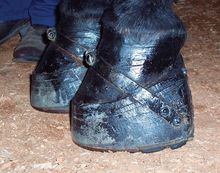Friends of Sound Horses (FOSH) announces its support of the Prevent All Soring Tactics (PAST) bill introduced by Representative Ed Whitfield (R-KY) which provides stronger measures to fight the abuse of soring of Tennessee Walking Horses.

Pain-inducing stacked hooves
Soring is a major animal welfare issue that has been illegal for over forty years under the federal Horse Protection Act (HPA) yet the practice is still widespread in show rings.
Soring of horses is the cruel and deliberate infliction of chemical or mechanical pain upon a horseâs hooves and limbs to create an unnatural, exaggerated, high stepping gait for the show ring. Soring is a major animal welfare issue that has been illegal for over forty years under the federal Horse Protection Act (HPA) yet the practice is still widespread in show rings of Tennessee Walking Horses, Spotted Saddle Horses and Racking Horses.
Such relief cannot arrive too soon for Walking Horses. The United States Department of Agriculture (USDA) recently released swabbing results for 2012 Tennessee Walking Horse shows, and the results are appalling.
Of 24 shows swabbed, the overall average for testing positive for foreign substances, including numbing agents, was 65% and some shows were at 100%. Numbing agents are used on a horseâs front legs to ensure they pass inspection when checked by a designated qualified person (DQP) before entering the show ring.
The numbing agents wear off by the time the horse is exhibited so they still achieve their pain induced, high-stepping gait.
Another method of soring uses stacked hooves. "Stacks" up to 5" high and filled with a variety of substances for added weight, are attached to the front hooves, causing the horse to stand perpetually in an elevated, unnatural position. This type of shoeing causes chronic, constant pain. Heavy Plantation shoes weighing up to 5 lbs. are also used.
Stacks can vary in height. They are usually made of plastic, although some may be made of leather. Stacks have a metal band that runs across the hoof to help keep them on the horse's foot. Stacks may be up to 4" thick in the heel and no more than 2" in the toe.
The band that holds the stack cuts into the hoof and may wear a slot into it. However, it is a common practice for a trainer to loosen the band when the horse is not being exercised, thus eliminating this problem. It is also dangerous if a horse wearing stacks tears off a shoe, as the stack will come off and the band may rip into the hoof and tear off a good part of the hoof wall.
The percentage of foreign substances abuse is even higher for the Walking Horse industryâs most revered show, the National Celebration in Shelbyville, TN held in August each year. In 2012, the USDA swabbed 190 horses and 145 tested positive (76%) for foreign substances including caustic agents and numbing substances.
It is highly possible horses that tested positive went onto win their classes and now hold titles of World Grand Champions on their registration papers. Although swabbing has been ongoing by the USDA for several years, at this time there has been no effort by Celebration management or the Tennessee Walking Horse Breeders and Exhibitors Association (TWHBEA) to remove titles from horses that tested positive for foreign substances.
FOSH is a national leader in the promotion of natural, sound gaited horses and actively fights against abuse and soring of Tennessee Walking Horses. Become a member of FOSH and help in its efforts to fight soring.
